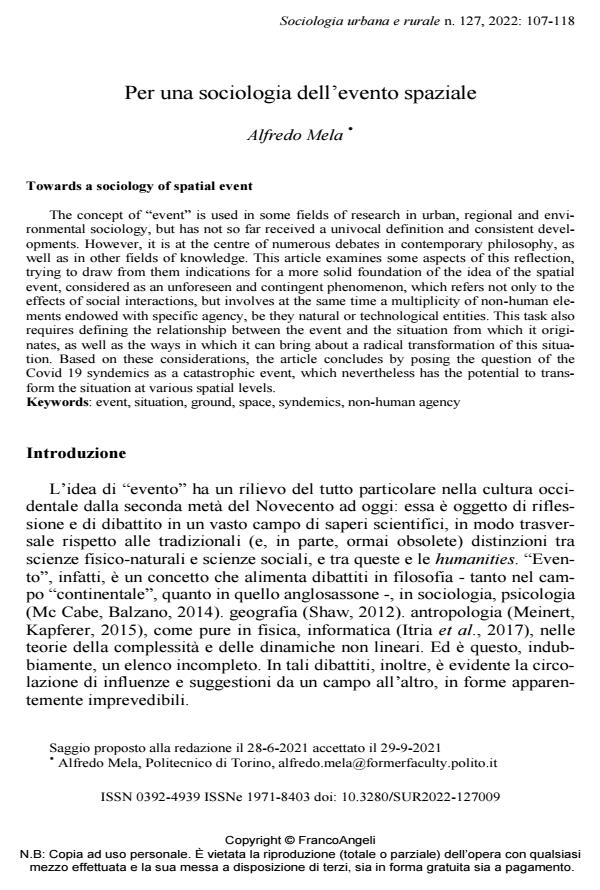Towards a sociology of spatial event
Journal title SOCIOLOGIA URBANA E RURALE
Author/s Alfredo Mela
Publishing Year 2022 Issue 2022/127
Language Italian Pages 12 P. 107-118 File size 264 KB
DOI 10.3280/SUR2022-127009
DOI is like a bar code for intellectual property: to have more infomation
click here
Below, you can see the article first page
If you want to buy this article in PDF format, you can do it, following the instructions to buy download credits

FrancoAngeli is member of Publishers International Linking Association, Inc (PILA), a not-for-profit association which run the CrossRef service enabling links to and from online scholarly content.
The concept of "event" is used in some fields of research in urban, regional and environ-mental sociology, but has not so far received a univocal definition and consistent develop-ments. However, it is at the centre of numerous debates in contemporary philosophy, as well as in other fields of knowledge. This article examines some aspects of this reflection, trying to draw from them indications for a more solid foundation of the idea of the spatial event, con-sidered as an unforeseen and contingent phenomenon, which refers not only to the effects of social interactions, but involves at the same time a multiplicity of non-human elements en-dowed with specific agency, be they natural or technological entities. This task also requires defining the relationship between the event and the situation from which it originates, as well as the ways in which it can bring about a radical transformation of this situation. Based on these considerations, the article concludes by posing the question of the Covid 19 syndemics as a catastrophic event, which nevertheless has the potential to transform the situation at vari-ous spatial levels.
Keywords: Keywords: event, situation, ground, space, syndemics, non-human agency
- Abrams P. (1982). Historical sociology. Ithaka (NY): Cornell University Press.
- Badiou A. (1988). L’Être et l’Événement. Paris: Seuil.
- Badiou A. (2006). Logique des Mondes. L’être et l’événement 2. Paris: Seuil.
- Badiou A. (2007). The event in Deleuze. Parrhesia, 2: 37-44.
- Badiou A. (with Tarby F.) (2013). Philosophy and the Event. Cambridge-Malden: Polity Press.
- Beck U. (2016). The Metamorphosis of the World. Cambridge-Malden: Polity Press (trad. it: La metamorfosi del mondo. Roma-Bari: Laterza, 2017).
- Bensaïd D. (2001). Alain Badiou et le miracle de l’événement. In Bensaïd D. Résistances: Essai de taupologie générale. Paris: Fayard.
- Casati R., Varzi A. (2008). Event concepts. In Shipley T., Zacks J. (a cura di). Understanding events. Oxford: Oxford University Press.
- Dansero E., Mela A., Saquet M.A. (2016). A territorialização dos grandes eventos: uma sintese interpretativa. In Ferreira Freitas R., Lins F., Carmo M.H. (a cura di). Megaeventos, Comunicação e Cidade. Curitiba: CRV.
- Diamond J. (2004). Collapse: How Societies Choose to Fail or Succeed. New York: Viking Adult.
- Dynes R. (1987). Introduction. In Dynes R., De Marchi B., Pelanda C. (eds.). Sociology of Disasters. Contribution of Sociology to Disaster Research. Milano: FrancoAngeli.
- Funtowicz S., Ravetz J.R. (1994). Emergent complex systems. Futures, 26(6): 568-582.
- Heiden van de G.J. (2014). Ontology after ontotheology: Plurality, event, and contingency in contemporary philosophy. Pittsburgh: Duquesne University Press.
- Hobson J.M., Lawson G., Rosenberg J. (2010). Historical sociology. In Denemark R.A. (eds.). The International Studies Encyclopedia. Oxford: Wiley Blackwell.
- Itria M.L., Kocsis-Magyar M., Ceccarelli A., Lollini P., Giunta G., Bondavalli A. (2017). Identification of critical situations via event processing and event trust analysis. Knowledge and Information Systems, 52(1): 147-178.
- Knudsen B.T, Christensen D.R., Blenker P. (eds.) (2014). Enterprising Initiatives in the Experience Economy: Transforming Social Worlds. London-New York: Routledge.
- Laruelle F. (2000). Identity and event. Pli: The Warwick Journal of Philosophy, Parallel Processes, 9: 174-189.
- McCabe V., Balzano G.J. (a cura di) (2014). Event cognition: An ecological perspective. New York: Psychology Press.
- McGowan T. (2010). Subject of the event, subject of the act: The difference between Badiou’s and Žižek’s systems of philosophy. Subjectivity, 3(1): 7-30.
- Meinert L., Kapferer B. (eds.) (2015). In the event: Toward an anthropology of generic moments. New York-Oxford: Berghahn Books.
- Mela A. (2020). La città postmoderna, spazi e culture. Roma: Carocci
- Morgeson F.P., Mitchell T.R., Liu D. (2015). Event system theory: An event-oriented approach to the organizational sciences. Academy of Management Review, 40(4): 515-537.
- Sangaramoorthy T., Benton A. (2021). Intersectionality and syndemics: A commentary. Social Science & Medicine, 113783.
- Schillmeier M. (2014). Eventful bodies: The cosmopolitics of illness. Farmham: Ashgate.
- Shaw I.G. (2012). Towards an evental geography. Progress in Human Geography, 36(5): 613-627. DOI: 10.1177/030913251143500
- Singer M., Bulled N., Ostrach B., Mendenhall E. (2017). Syndemics and the biosocial conception of health. The Lancet, 389: 941-950.
- Srnicek P. (2008). What is to be done? Alain Badiou and the Pre-Evental. Symposium, 12(2): 110-126.
- Sztompka P. (2008). The focus on everyday life: A new turn in sociology. European Review, 16(1): 23-37. DOI: 10.1017/S106279870800004
- Wagner-Pacifici R. (2017). What is an Event? Chicago-London: The University of Chicago Press.
- Werron T., Ringel L. (2020). Pandemic Practices, Part One. How to Turn “Living Through the COVID-19 Pandemic” into a Heuristic Tool for Sociological Theorizing. Sociologica, 14(2): 55-72.
- Žižek S. (2014). Event: Philosophy in Transit. London: Penguin Books.
Alfredo Mela, Per una sociologia dell’evento spaziale in "SOCIOLOGIA URBANA E RURALE" 127/2022, pp 107-118, DOI: 10.3280/SUR2022-127009